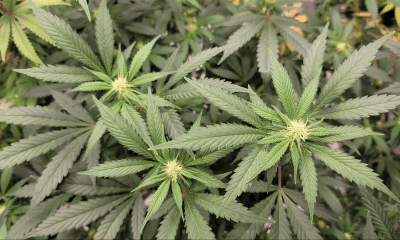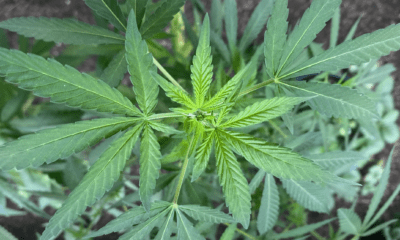Politics
Vermont Governor Allows Marijuana Sales Legalization Bill To Take Effect Without His Signature

The governor of Vermont announced on Wednesday that he will allow a bill to legalize marijuana sales in the state to take effect without his signature. He also signed separate legislation to automate expungements for prior cannabis convictions.
While Vermont legalized personal possession of up to one ounce and cultivation of two plants for adults in 2018, retails sales have remained prohibited. But now with Gov. Phil Scott’s (R) decision not to veto the new cannabis commercialization bill, a tax-and-regulate system will finally be implemented.
Differing versions of the marijuana sales proposal passed each chamber before being reconciled in a bicameral conference committee last month. The legislature then approved the finalized proposal and sent it to Scott’s desk. The governor had been noncommittal about his plans for the legislation—even up until the day before the signature deadline—and had hinted that he was even considering vetoing the bill. But he ultimately gave legal cannabis supporters a win by deciding not to block the reform.
In the conference committee, legislators worked fastidiously to ensure that Scott’s stated concerns about the policy change were largely addressed. Those issues primarily related to impaired driving, taxes and local control.
But after the legislature advanced a finalized form, Scott threw advocates for a loop, stating that while he appreciated the legislative process that the bill went through, certain racial justice groups had raised concerns with his office about the extent to which the proposal addressed social equity in the cannabis industry for communities historically targeted by the war on drugs. There was some suspicion that the governor was using that pushback as an excuse to veto S. 54.
On Tuesday, the day before his deadline to act on the bill, the governor said lawmakers “did move forward in a lot of areas that I had concerns about, but it still isn’t exactly what I’d like to see and there are some shortcomings.”
In the end, however, he stood out of the way and took no proactive action.
“However, there is still more work to be done to ensure the health and safety of our kids and the safety of our roadways—we should heed the public health and safety lessons of tobacco and alcohol,” Scott wrote in a letter to lawmakers announcing his decision. “Further, I believe we are at a pivotal moment in our nation’s history which requires us to address systemic racism in our governmental institutions. We must take additional steps to ensure equity is a foundational principle in a new market.”
“The concerns with this bill of the communities historically most negatively affected by cannabis enforcement were not meaningfully incorporated into this bill,” he said.
The governor raised several areas where he feels lawmakers can tweak the legislation in the 2021 session.
The new law will give existing medical cannabis businesses an “an unfair head start on market access” over would-be new entrants to the legal industry, he said, arguing that lawmakers “should consider include creating a social equity applicant category for cannabis establishment licenses” as well as a 50 percent licensing fee waiver for those applicants and additional technical and financial assistance.
“And in the event the Legislature maintains the current integrated licensing structure, to make it more equitable revenues from those licensees could be directed to benefit social equity applicants and the communities historically most negatively impacted by cannabis enforcement,” Scott wrote.
He also expressed concern about cannabis vaping products, marketing that could appeal to youth, roadside impaired driving enforcement training for police and the timeline for appointing a new regulatory board as well as the process by which its members could be removed.
Finally, Scott said that the 30 percent of cannabis excise taxes that are set aside for substance misuse prevention programs should be allocated by the Commissioner of Health. “As passed, this funding could be raided by the Legislature and used for other unrelated purposes,” he wrote.
It’s possible that there was some political calculus involved in the decision to let the bill go into law despite his concerns, as his reelection challenger, Lt. Gov. David Zuckerman (D), is a vocal advocate for legalization and has raised the issue in recent appearances.
Zuckerman stressed in a debate last week that while he agrees with the sentiment that more needs to be done to ensure racial justice, an imperfect bill can be improved upon, and the legislature has plenty of time to finesse the details before legal cannabis sales launch.
He also noted that separate legislation providing for automatic expungements of prior cannabis convictions, which Scott signed on Wednesday, would complement the restorative justice provisions of the tax-and-regulate bill.
A coalition of Vermont civil rights and criminal justice reform groups including the state’s ACLU chapter released a statement on Sunday that says while they shared concerns about the limitations of the social equity components of the marijuana commerce bill, they felt it could be built upon and wanted the governor to sign it, in addition to the expungements legislation.
“This has been a top priority for the majority in the Legislature for four years, but their work is not complete,” Scott said on Wednesday. “They must ensure equity in this new policy and prevent their priority from becoming a public health problem for current and future generations.”
Legalization advocates celebrated the fact that another state system of regulated cannabis sales is set to come online.
“It’s a great relief to learn that Vermont will finally move forward with plans to replace prohibition with sensible regulation,” Matt Simon, New England Political Director for the Marijuana Policy Project, told Marijuana Moment. “Legislators bent over backwards to address Gov. Scott’s concerns throughout this process, and it’s now clear that these difficult compromises weren’t made in vain.”
“Much work remains to create a responsible and equitable cannabis industry in Vermont, but now that S. 54 has passed the state is definitely on the right track,” he said.
State Attorney General T.J. Donovan (D) said in a Twitter post that the new bill “brings good governance & common sense to VT’s cannabis law. It will provide revenue to fund protections for consumers, education programs & safety measures.”
Over the past year I have advocated for a system to tax & regulate the sale & consumption of cannabis. S.54 brings good governance & common sense to VT’s cannabis law. It will provide revenue to fund protections for consumers, education programs & safety measures. #vtpoli
— Vermont AG Donovan (@VTAttorneyGen) October 7, 2020
Under the tax-and-regulate bill, a new Cannabis Control Commission will be responsible for issuing licenses for retailers, growers, manufacturers, wholesalers and labs. The body will also take over regulation of the state’s existing medical cannabis industry from the Department of Public Safety.
A 30 percent THC limit will be imposed on cannabis flower, while oils could contain up to 60 percent THC. Flavored vape cartridges will be banned.
Local jurisdictions will have to proactively opt in to allow marijuana businesses to operate in their area. Municipalities will also be able to establish their own regulations and municipal licensing requirements.
A timeline for the legislation states that it will formally take effect on October 1, 2020—but regulators would then have to make a series of determinations about rules and licensing before retail sales would launch. Dispensary licenses will have to be issued on or before October 1, 2022.
A fiscal analysis on the final bill projects that Vermont will generate between $13.3 million and $24.2 million in annual cannabis tax revenue by Fiscal Year 2025. Licensing fees will lead to additional funds for the state, but the regulatory board created by the legislation will set those levels at a later date. For now, the Joint Fiscal Office estimates the fees could lead to another $650,000 in revenue every year. Municipalities hosting marijuana businesses will also be able to levy additional local fees.
The separate expungements bill would make it so those with convictions for marijuana possession of up to two ounces, four mature plants and eight immature plants prior to January 2021 would have their records automatically cleared. Those who receive expungements would be notified by mail.
The governor had vetoed an earlier version of a noncommercial legalization bill in 2018 before negotiating changes with lawmakers that made him comfortable with signing revised a revised form of the legislation.
Read Scott’s full letter to lawmakers below:
Vermont Governor Marijuana Bill Letter by Marijuana Moment on Scribd
New Jersey Governor Promotes Marijuana Legalization Referendum In New Ad
Photo courtesy of WeedPornDaily.
















